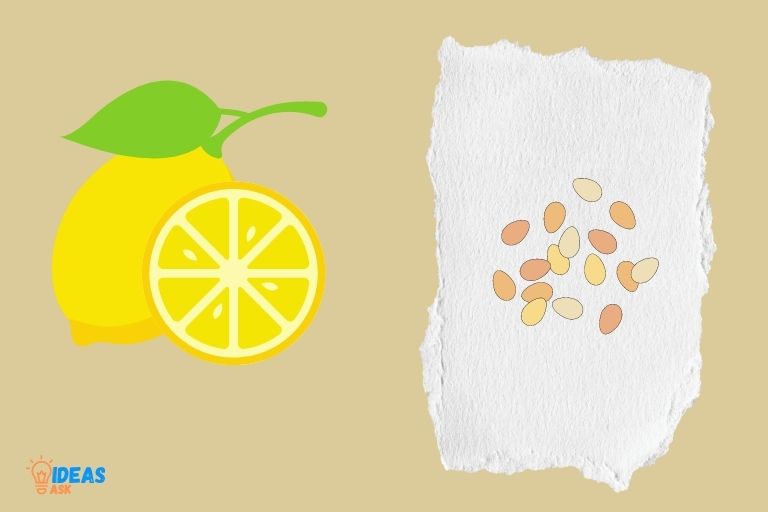How to Germinate Lemon Seeds in Paper Towel? 7 Steps!
To germinate lemon seeds in a paper towel, follow these steps:
1) Extract seeds from a fresh lemon
2) Rinse the seeds and remove any debris
3) Allow the seeds to dry slightly
4) Moisten a paper towel and place the seeds on it
5) Fold the paper towel over the seeds
6) Place the folded towel inside a ziplock ba,
7) Store the bag in a warm, dark place.
Check the seeds regularly for germination, which should occur within one to three weeks.
Germinating lemon seeds in a paper towel is a popular method because it offers a controlled environment for the seeds, allowing them to absorb moisture and warmth while being protected from pests or harsh conditions.
The moist paper towel provides the necessary moisture for the seeds to swell and begin germinating, while the ziplock bag retains that moisture and creates a mini greenhouse effect for the seeds.
Germinating lemon seeds in a paper towel is a simple and cost-effective method for starting your very own lemon tree. This technique allows gardeners to closely monitor the germination process and provides a clean, controlled environment for the seeds to thrive.
With patience and proper care, you’ll soon have healthy lemon seedlings ready to be transplanted into soil and grown into beautiful, fruit-bearing trees.
Step-by-Step Process to Germinate Lemon Seeds in Paper Towel
| Step | Description |
|---|---|
| 1 | Collect lemon seeds from a fresh lemon. Rinse the seeds thoroughly to remove any fruit residue. |
| 2 | Fold a paper towel into a square or rectangle, large enough to hold all the seeds but small enough to fit into a sealable plastic bag. |
| 3 | Moisten the paper towel with water, making sure it’s damp but not soaking wet. |
| 4 | Evenly space the lemon seeds on the moistened paper towel. |
| 5 | Fold the paper towel over the seeds, completely covering them. |
| 6 | Place the folded paper towel with seeds inside a sealable plastic bag. |
| 7 | Seal the plastic bag, trapping in moisture to create a greenhouse effect for germination. |
| 8 | Place the sealed plastic bag in a warm location, ideally between 68°F-72°F (20°C-22°C). Choose a location with indirect sunlight, as direct sunlight can cause the temperature to rise and damage the seeds. |
| 9 | Check the seeds regularly, keeping the paper towel moist by adding water if necessary. Look for seeds to sprout and develop small roots, which may take 10-14 days. |
| 10 | When seedlings have sprouted and developed a few small roots, carefully transplant them into a small pot with well-draining soil. Keep the soil moist and place the pot in a sunny location for continued growth. |
Key Takeaway

Five Facts About Germinating Lemon Seeds in Paper Towel”
Understanding The Germination Process For Lemon Seeds
The Benefits Of Germinating Lemon Seeds In Paper Towel
Germinating lemon seeds in paper towels is an easy and effective way to start growing your own citrus trees.
Here are the benefits of germinating lemon seeds in paper towel:
- It’s a cost-effective way to start growing your own lemon trees.
- It eliminates the guesswork of planting multiple seeds in a pot and waiting to see which ones sprout.
- It allows you to control the environment for optimal germination and growth.
- It’s a fun and educational project for all ages.
The Anatomy Of A Lemon Seed: Understanding The Parts Involved In Germination
Before diving into the process of germinating lemon seeds in paper towel, it’s helpful to understand the anatomy of a lemon seed.
Here are the three main parts involved in germination:
- The seed coat: This is the protective outer layer of the seed that helps keep it from drying out or being eaten by predators.
- The embryo: This is the tiny, developing plant inside the seed that will eventually sprout and grow into a lemon tree.
- The endosperm: This is the food source inside the seed that provides the embryo with the nutrients it needs to sprout and start growing.
What Lemon Seeds Need To Germinate: Important Factors For Successful Germination
Germinating lemon seeds in paper towel requires a few simple but crucial factors for success.
Here’s what you need to consider:
- Moisture: Lemon seeds need moisture to germinate, but not too much or they’ll rot. Paper towels provide a moist but not waterlogged environment.
- Warmth: Lemon seeds need warmth to sprout, so find a warm spot in your house.
- Light: Once the seeds have sprouted, they need light to continue growing. Be sure to move them to a bright location.
- Time: Lemon seeds can take anywhere from 7 to 21 days to sprout, so be patient and check them regularly.
Remember, germinating lemon seeds in paper towel is just the first step in growing your own lemon tree.
Once they have sprouted and started to grow, you’ll need to transplant them into larger containers with soil, water them regularly, and give them plenty of light and warmth.
Enjoy the process and watch your lemon tree grow!
Preparing Lemon Seeds For Germination
Harvesting Lemon Seeds: Knowing When Is The Best Time To Collect Them
When you decide to germinate lemon seeds, you must harvest them at the right time.
Here are the key points to consider:
- Harvest lemon seeds when the fruit is ripe: Lemon seeds are ready to be harvested when the lemon is ripe. A ripe lemon will have a bright yellow color.
- Look for healthy fruit: Choose fruit that is free from bruises, blemishes, or any signs of decay. Healthy fruits produce healthy seeds.
- Use fresh lemons: Collect fresh lemon seeds as they have a higher germination rate.
Cleaning And Sorting Lemon Seeds: Tips And Tricks
To germinate lemon seeds properly, you must clean and sort them.
Here are the essential tips and tricks to follow:
- Remove seeds from the fruit: Cut the lemon in half, and remove the seeds carefully.
- Sort the seeds: Remove any damaged, small, or unhealthy seeds. Keep the plump, large, and healthy seeds only.
- Rinse the seeds: Rinse the selected seeds in tap water to remove any remaining pulp, and lay them on a paper towel to dry.
Soaking Lemon Seeds In Water: Why It’S Important And How To Do It
Soaking lemon seeds in water before you germinate them breaks their dormancy and softens their outer layers.
Here are the key points to remember:
- Use room temperature water: Fill a bowl with clean, room temperature water and add the lemon seeds.
- Soak the seeds overnight: Allow the seeds to soak for at least 12 hours. Don’t leave them for more than 24 hours, as this may damage the seeds.
- Change the water: After soaking, drain the water and rinse the seeds. Repeat this process every day for the next two days.
These three steps are crucial in preparing lemon seeds for germination. By acquiring ripe lemons, sorting and cleaning the seeds and soaking them in water, you can increase the germination rate of your lemon seeds.
Try it out and enjoy the fruit of your labor!
Germinating Lemon Seeds In Paper Towel
Growing your own lemon tree from seeds is a rewarding and exciting endeavor. However, the process of germinating lemon seeds can be daunting if you don’t have reliable information.
One of the easiest, most cost-effective and successful methods of germinating lemon seeds is by using a paper towel. In this post, we’ll guide you through the process of germinating lemon seeds in paper towel.
Choosing The Best Paper Towels For Germination: Key Features To Look For
Choosing the right paper towels for your lemon seed germination is the first step towards a successful outcome.
Here are some key features to look for in paper towels:
- Softness and absorbency are crucial, as you want to retain moisture and keep the seeds moist throughout the germination period.
- Avoid colored and printed paper towels as they may contain chemicals that can harm the seeds.
- Unbleached and undyed white paper towels are the best to use.
Preparing The Paper Towel: Folding Techniques And Moistening Tips
Once you have chosen the right paper towels, it’s time to prepare them for the germination process. Here’s how you can do it:
- Cut the paper towel into quarters, each piece should be large enough to wrap your seeds.
- Dampen the paper towel with water and wring it out to remove excess water. The paper towel should be moist but not dripping.
- Fold the paper towel in half and place the seeds in the center of the fold. Be sure not to put more than two seeds per paper towel, as they need space to grow.
- Fold the paper towel again to cover the seeds.
Placing The Lemon Seeds In Paper Towel: Step-By-Step Instructions
Now that you have prepared the paper towel, it’s time to place the lemon seeds in it.
Here are the step-by-step instructions:
- Take a paper towel with seeds and place it in a sealable plastic bag. Leave the bag partially open to allow air circulation.
- Place the bag in a warm, bright location and avoid direct sunlight. A warm and humid environment is crucial for seed germination.
- Check the paper towel every few days to make sure it’s still moist. If needed, dampen it again with a spray bottle of water.
- After around two to three weeks, the lemon seeds will start to germinate. Wait until a small root appears before transplanting to soil
Germinating lemon seeds in paper towel can be a fun and successful process if done correctly. By following the above steps you’ll be on your way to growing your own lemon tree.
Happy growing!
Caring For Germinating Lemon Seeds
How to germinate lemon seeds in paper towel: caring for germinating lemon seeds
If you’re looking to grow your lemon trees, germinating lemon seeds in a paper towel is a simple and cost-effective way to do it.
However, caring for germinating lemon seeds is just as important as the germination process itself.
Providing Optimal Growing Conditions: Temperature And Light Guidelines
Proper temperature and light are critical factors that can make or break the germination process of lemon seeds.
Here are some key guidelines to follow:
- Temperature: The ideal temperature for germinating lemon seeds is around 70 to 75°f (21 to 24°c). You can achieve this by keeping the seeds in a warm location or using a heat mat.
- Light: Lemon seeds do not require full sunlight to germinate, but they do need some light. Place the seeds in a partially shaded area or use a fluorescent grow light to provide adequate light.
Watering And Hydrating Lemon Seeds: How To Balance Moisture And Airflow
Overwatering or underwatering can both harm your lemon seeds and hinder the germination process. It’s essential to strike a balance between moisture and airflow.
Here are some guidelines to follow:
- Moisture: Keep the paper towel moist, but not soaking wet. Spritz the paper towel with water every day or as needed to keep the seeds damp.
- Airflow: Proper airflow is necessary to prevent mold and disease from developing. Ensure that the paper towel isn’t too wet and has room for air circulation to promote a healthy growing environment.
Addressing Possible Problems: Pests, Diseases, And Other Issues To Watch Out For
Like any plants, germinating lemon seeds can encounter pests, diseases, and other issues.
Here are some problems to watch out for:
- Pests: Aphids, spider mites, and mealybugs are common pests that attack lemon trees. Use natural pest control methods like insecticidal soap or neem oil to prevent and control infestations.
- Diseases: Root rot and powdery mildew are common diseases that affect lemon seeds. Keep the paper towel moist but not too wet and avoid overwatering to prevent root rot. Use a fungicide to treat powdery mildew.
- Other issues: Lemon seeds may fail to germinate due to improper storage, poor quality seeds, or unsuitable conditions. Be patient, and continue to provide optimal growing conditions for the seeds.
Germinating lemon seeds in paper towels is a simple and effective way to grow your lemon trees. Remember to follow the guidelines for temperature, light, moisture, and airflow to ensure successful germination and healthy growth.
Additionally, be aware of possible pests, diseases, and other issues that may occur and take prompt action to prevent or treat them. With proper care and patience, you can enjoy fresh lemons from your own tree in no time.
Transplanting Lemon Seedlings Into Containers Or The Garden
Germinating lemon seeds in paper towels is a great project for those who love growing plants. Once your lemon seeds have germinated, you will need to transplant them into a container or the garden.
In this section, we will discuss the signs that tell you when the seedlings are ready for transplantation, tips on choosing the right soil for lemon seedlings, and best practices for transplanting lemon seedlings from paper towel to their new homes.
Knowing When Seedlings Are Ready For Transplantation: Signs To Look For
Before you transplant your lemon seedlings, it is essential to know when they are ready.
Here are some signs to look for:
- True leaves have appeared on the seedlings
- The seedlings have grown about 2-4 inches tall
- The roots are visible on the bottom of the paper towel
- The seedlings are sturdy and not fragile
Transplanting the seedlings when they are too young can result in the seedlings dying, as they are too fragile to handle the process. Therefore, it is best to wait for the seedlings to grow and develop a strong root system before you consider transplanting them.
Choosing The Right Soil For Lemon Seedlings: Tips And Recommendations
Once the seedlings are ready for transplantation, you need to choose the right soil to ensure their proper growth and development.
Here are some tips and recommendations:
- Choose a well-draining soil, such as a soil mix designed for seedlings or a mixture of vermiculite and peat moss
- Avoid using heavy soils or those that retain too much moisture, as this can lead to root rot
- Mix in some slow-release fertilizer, such as fish emulsion or kelp meal, to provide the seedlings with essential nutrients
It is essential to ensure that the soil you choose for your lemon seedlings is fertile and well-draining. Lemon trees need well-drained soil to prevent water-logged roots, which can damage or kill the tree.
Transplanting Lemon Seedlings From Paper Towel To Their New Homes: Best Practices
Now that you have your well-draining soil and your seedlings are ready, it is time to transplant them.
Here are the best practices for transplanting lemon seedlings from paper towel to their new homes:
- Gently remove the seedlings from the paper towel using a pair of tweezers or your fingers
- Dig a small hole in the soil, big enough to fit the root system of the seedling
- Place the seedling into the hole and fill it with soil, ensuring that the soil is firm around the base of the seedling
- Water the seedling thoroughly, making sure that the soil is moist but not waterlogged
It is essential to handle the seedlings with care during the transplantation process to avoid damaging the roots or the stem.
Once the seedlings are in their new homes, they may experience some shock as they adjust to their new environment. However, with proper care and attention, your lemon seedlings will grow into healthy trees.
FAQ About Germinating Lemon Seeds In Paper Towel
How Do You Prepare Lemon Seeds For Germination?
To prepare lemon seeds for germination, ensure to clean them properly, soak them in water overnight, and then remove the pulp.
What Is The Best Time To Germinate Lemon Seeds?
The best time to germinate lemon seeds is during the late winter or early spring.
Can I Germinate Lemon Seeds In Paper Towel?
Yes, you can germinate lemon seeds in a paper towel. It is an effective method to ensure successful germination.
How Long Does It Take To Germinate Lemon Seeds?
It takes around 7-21 days for lemon seeds to germinate using the paper towel method. However, it may take longer in some cases.
Conclusion
After following the simple steps outlined in this article, you should now be able to germinate lemon seeds using paper towels effectively. This method is cost-effective and environmentally friendly compared to other practices, and it’s ideal for anyone who wants to try out gardening at home.
Whether you are an experienced gardener or just starting, growing a lemon plant from seeds can be an exciting and satisfying experience. Remember, your success in germinating the lemon seeds will depend on how well you keep the paper towel moist and warm.
Once your seeds have sprouted, we recommend transferring them to a pot or garden bed with well-draining soil and plenty of sunshine. With patience and consistent care, you’ll soon have your very own lemon tree bearing delicious fruit. Happy gardening!





